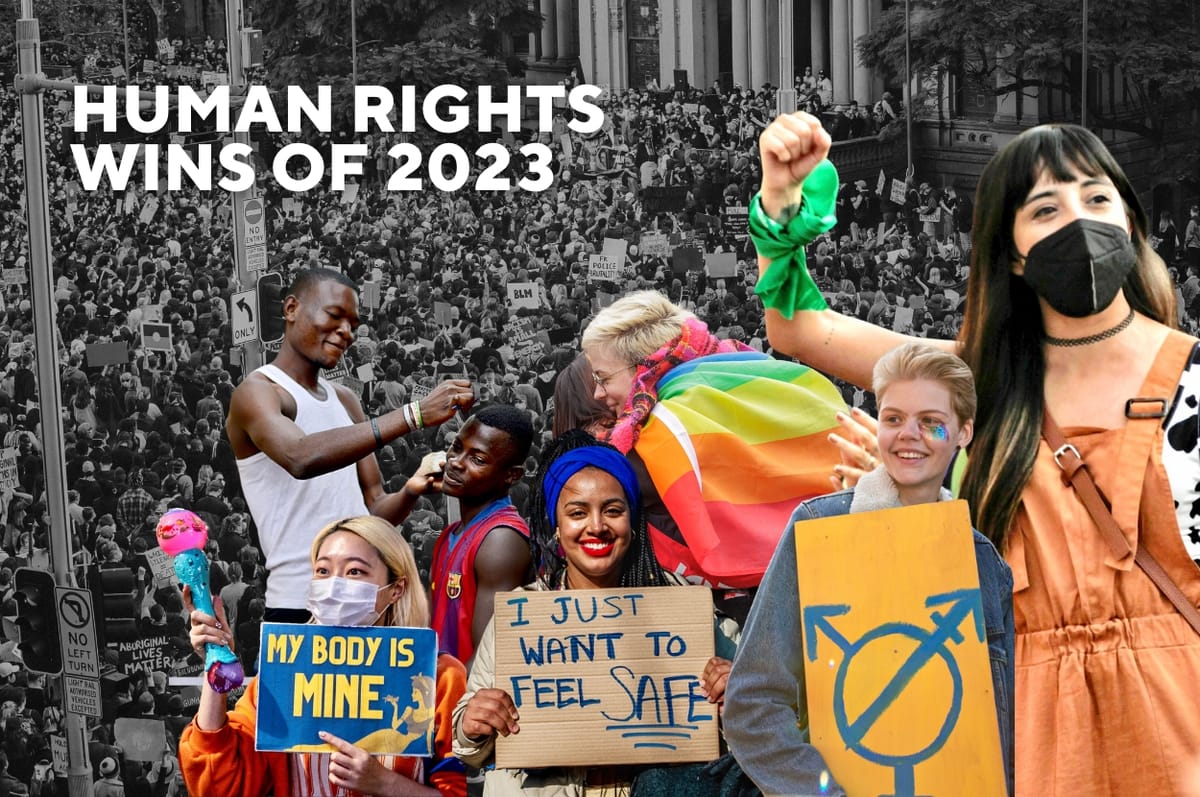10 Human Rights Wins To Celebrate In 2023
Here’s to a year of progress.

Here are 10 human rights wins to celebrate in 2023.
1. Mexico decriminalized abortion, becoming the latest country to do so in Latin America
Mexico’s Supreme Court has decriminalized abortion, becoming the latest country to do so in Latin America.
12 out of 32 states in Mexico have decriminalized abortion, but the Supreme Court decriminalized it across the whole country Wednesday Sep. 6.
In its ruling, the high court found that Mexico’s laws making abortion a crime are unconstitutional because they violate the rights of women and girls.
It ordered abortion be removed from the penal code, meaning that federal public health institutions will be required to offer abortion to anyone who requests it.
The move comes two years after the Supreme Court voted in 2021 to strike down a law in the northern state of Coahuila that criminalized abortion, finding it unconstitutional.
At that point, abortion was only legal in Mexico City and three other states, except in cases of rape or when a mother’s life is in danger.
2. Abortions are now allowed in Malta when a woman’s life is in danger
In a small step for women’s rights, Malta has eased its abortion law to allow the procedure when the woman’s life is in danger.
Abortion had been illegal in Malta under all circumstances, even in cases of rape, incest or fetal abnormalities.
Having an abortion or helping someone to get an abortion could result in three years in prison.
Although the law had been rarely enforced, earlier in June, a woman was convicted for having an abortion although not jailed.
The law was introduced in June 2022 after an American tourist nearly died in Malta from pregnancy complications when doctors refused to perform an abortion.
A previous version of the law had allowed abortions when a woman’s life or health was at risk.
But “health” was removed from the law after anti-abortion groups said it was “too vague”.
However, the new law only allows abortions when a woman may die.
Doctors also have to refer pregnant people to a three-doctor panel before they are granted access to an abortion.
Rights groups say this could result in delays that could be fatal.
3. Japan finally raised the age of sexual consent from 13 to 16
Japan has finally raised the country’s age of sexual consent from 13 to 16 as part of a wider reform of the country’s laws on sex crimes.
The law was proposed after the acquittal of several accused rapists in 2019, which sparked public outrage.
In one case, a court acquitted a father who had repeatedly raped his teenage daughter even after it recognized the girl had not consented.
The court said there was no definitive proof that the girl was unable to resist psychologically – as in she could have if she wanted to.
The acquittal was later overturned by a higher court.
The new law, which was passed unanimously on Friday June 16, now expands the definition of rape from “forcible sexual intercourse” to “non-consensual sexual intercourse”.
It also clearly outlines eight situations that are considered rape, including when the victim is under the influence of alcohol or drugs, or if the perpetrator frightens them or takes advantage of their social status.
The new law also makes grooming minors and voyeurism, such as when people take upskirt photos or videos or secretly film sexual acts, a crime.
4. The Netherlands has passed a “Only Yes Means Yes” law clearly defining rape as sex without consent
The Netherlands has passed a “only yes means yes” bill that clearly defines rape as sex without consent.
Previously, the law required proof that there was violence, threats or coercion in order for it to count as rape.
But the new law expands the definition of rape to sex without consent.
This comes after lower House of Representatives voted to amend the country’s law on Tuesday July 4.
The bill is expected to be voted into law by the upper house of the Senate within the next 9 months.
This would make the Netherlands the 17th country in Europe to adopt a law that recognizes non-consensual sex as rape.
5. Iceland has officially banned LGBTQ conversion therapy
Iceland has passed a law banning conversion therapy, a widely discredited practice that seeks to change or suppress a person’s sexual orientation, gender identity or gender expression.
So-called conversion therapy relies on the assumption that sexual orientation or gender identity can be changed or “cured.”
Some of these techniques include talk and behavioral therapy and medical treatments.
The law was passed unanimously by Iceland’s parliament on Monday June 9.
The new law makes it illegal for people to practice conversion therapy, with the sentence extending up to five years for practicing conversion therapy on children.
Those who conduct the practices can also face up to two years in prison.
6. Gay sex is no longer a crime in Mauritius
In a historic moment, Mauritius Supreme Court has ruled that criminalizing same-sex acts is unconstitutional.
In Mauritius, a British colonial-era law criminalized anal intercourse between gay men with up to five years in prison.
On Wednesday Oct. 4, the court determined the law breached people’s rights to freedom of expression, privacy, and liberty, ending the 185 years colonial law.
7. Estonia legalized same-sex marriage and adoption
Estonia has legalized same-sex marriage and adoption after a historic vote at its parliament.
Same-sex partnerships have been legal in Estonia since 2016 but only heterosexual couples could get married.
Same-sex couples were also unable to adopt children together; one partner had to adopt the biological child or children of the other partner as a step-parent.
But on Tuesday June 20, Estonia’s parliament voted to amend the law so that two adults can marry “regardless of their gender” and adopt children together.“
This made Estonia the first Baltic state and ex-Soviet country to legalize same-sex marriage and adoption.
It is also the second central European country to reach marriage equality, after Slovenia in October 2022.
The new law will go into effect starting January 1, 2024.
8. Nepal also legalized same-sex marriage
Nepal became the world’s first least developed country to achieve marriage equality.
This comes after the country’s Supreme Court issued a temporary order to allow same-sex marriages on Wednesday June 28.
The temporary order was issued by a single judge as the court rules on a case brought forward by LGBTQ activists.
In November, it registered its first ever same-sex marriage between Maya Gurung, a transgender woman, and Surendra Pandey, a man.
Nepal is the second country in Asia to legalize same-sex marriage after Taiwan.
9. Ghana is abolishing the death penalty, becoming the 29th African country to do so
In a historic move, Ghana’s parliament has voted to abolish the use of capital punishment on Tuesday July 25, joining the growing list of African countries free of the death penalty.
Ghana has not carried out an execution since 1993, yet the courts have continued to hand down death sentences, including seven last year.
Murder, genocide, piracy and smuggling will now be punishable by life imprisonment instead of the death penalty.
With the new bill, 176 prisoners currently on death row, including six women, are expected to have their sentences commuted to life imprisonment.
High treason remains the only crime that is subject to the death penalty, but the country would need to revise its constitution in order for that to change.
The decision marks a significant step towards human rights progress, making Ghana the 29th African country and the 124th worldwide to abolish the death penalty, according to campaign organization, The Death Penalty Project.
The new bill will take effect once Ghana’s president, Nana Akufo-Addo, signs the bill into law.
10. Sierra Leone has passed a new law ensuring women get equal pay and hold 30% of public and private jobs
Sierra Leone’s president has approved a new law mandating women get equal pay and hold at least 30% of positions in government, as well as decision-making roles in both public and private jobs.
The law extends maternity leave from 12 weeks to 14 weeks and ensures women have equal access to training and credit and financial services.
Under the law, companies will be required to submit an annual report about its gender equality efforts.
Sierra Leone ranks one of the lowest in the world in gender equality, placing 182 out of 189 countries in the UN’s 2020 Gender Development Index.
Women face high levels of sexual violence, and the country has one of the world’s highest rates of teen pregnancy.
Currently, only 12% of parliamentarians and 17% of cabinet ministers are women.





